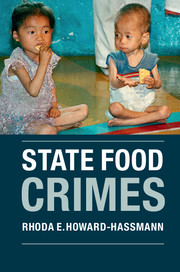Book contents
- Frontmatter
- Dedication
- Contents
- Acknowledgments
- Part I Introduction and Background
- Part II Contemporary Case Studies
- Part III Implications for the International Human Right to Food
- 8 International Law and the Right to Food
- 9 Sticks and Carrots: Sanctions and Food Aid
- 10 Interdependent Human Rights
- 11 Liberal Democracies and the Right to Food
- 12 A New International Treaty on the Right to Food
- Bibliography
- Index
12 - A New International Treaty on the Right to Food
from Part III - Implications for the International Human Right to Food
Published online by Cambridge University Press: 05 August 2016
- Frontmatter
- Dedication
- Contents
- Acknowledgments
- Part I Introduction and Background
- Part II Contemporary Case Studies
- Part III Implications for the International Human Right to Food
- 8 International Law and the Right to Food
- 9 Sticks and Carrots: Sanctions and Food Aid
- 10 Interdependent Human Rights
- 11 Liberal Democracies and the Right to Food
- 12 A New International Treaty on the Right to Food
- Bibliography
- Index
Summary
For a New International Treaty on the Right to Food
I propose that there should be a new and distinct United Nations treaty to protect the right to food. Such a treaty would reiterate the relevant clauses in the UN Genocide Convention and the Rome Statute of the International Criminal Court (ICC). It would include new measures prohibiting penal starvation and prescribing punishments for those engaged in it. It would revise international refugee law to include as refugees those who flee state-induced famine. It would specify obligations of both donor and recipient states regarding food aid, specify when and how sanctions could be invoked against states committing food crimes, and specify new rules for the responsibility to protect victims of state-induced famine. Such a treaty on the right to food would both indicate the responsibilities of states – to their own and other states’ citizens – and prescribe punishments of those who significantly violate these rights. Finally, it would reiterate the importance of civil and political rights to the “economic” human right to food.
In recommending a new treaty on the right to food I join David Marcus, who made such a recommendation in 2003. One of Marcus's aims was to specifically criminalize what he called famine crimes, defined as follows:
A person commits a first-degree famine crime when he or she knowingly creates, inflicts, or prolongs conditions that result in or contribute to the starvation of a significant number of persons.
A person commits a second-degree famine crime by recklessly ignoring evidence that his or her policies are creating, inflicting, or prolonging the starvation of a significant number of persons (Marcus 2003, 247).
Marcus argued that formal codification of famine crimes would debunk the myth that famines are the result of natural disasters and might force the international community to take action against them. He noted that under both the Geneva Conventions and international customary law, civilians were protected from famine in times of war but not peace (Marcus 2003, 265–71). He agreed that the crime of extermination, defined in the Rome Statute of the ICC as “the intentional infliction of conditions of life, inter alia the deprivation of access to food and medicine, calculated to bring about the destruction of part of a population” (International Criminal Court 1998 Article 7, 2, b) did fit peacetime famine crimes well.
- Type
- Chapter
- Information
- State Food Crimes , pp. 214 - 221Publisher: Cambridge University PressPrint publication year: 2016



